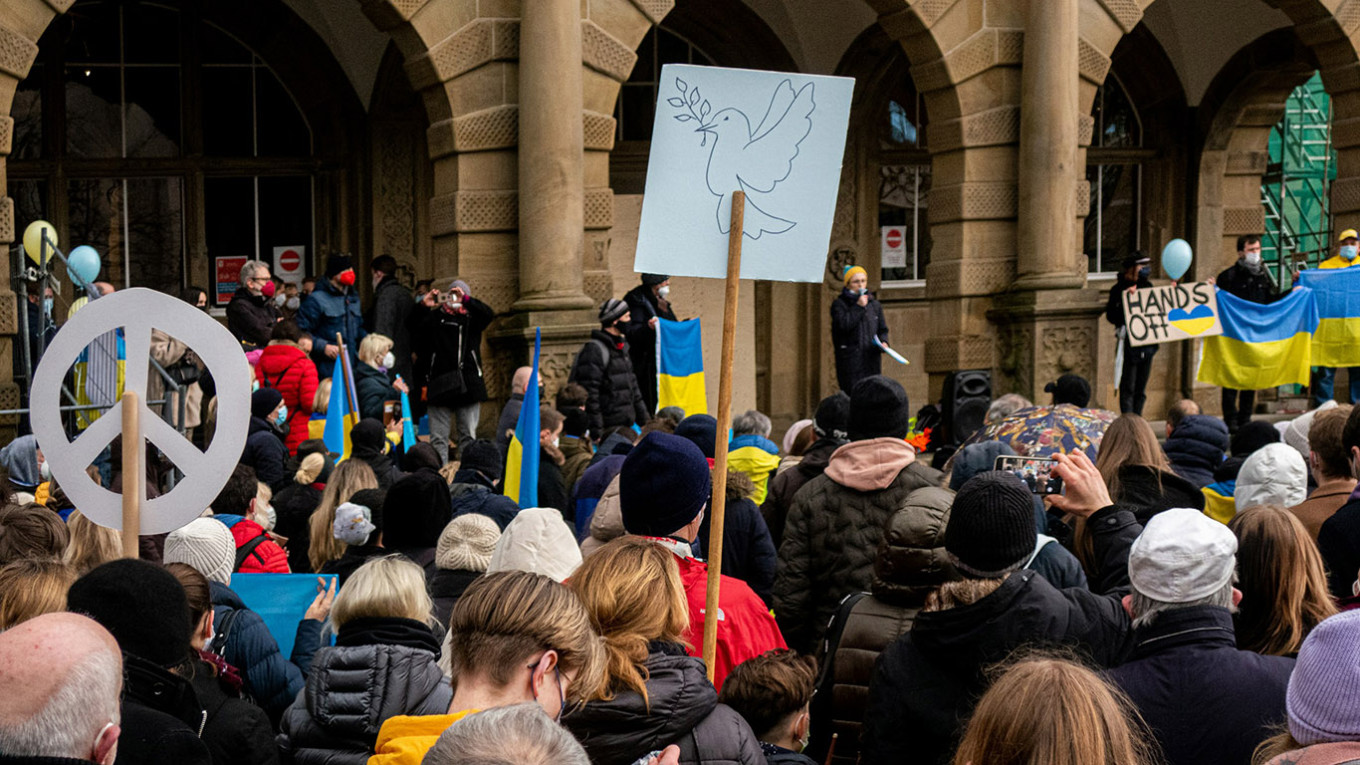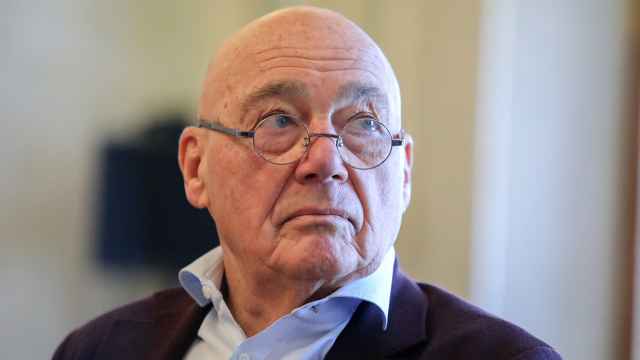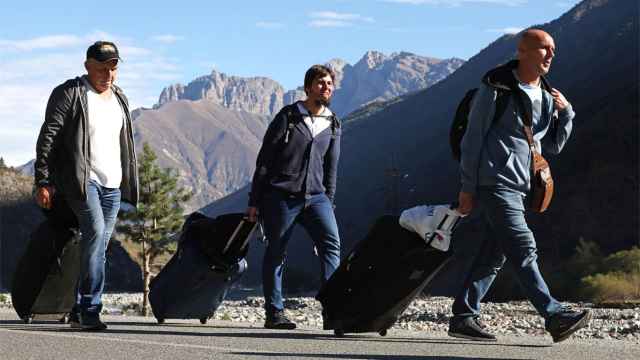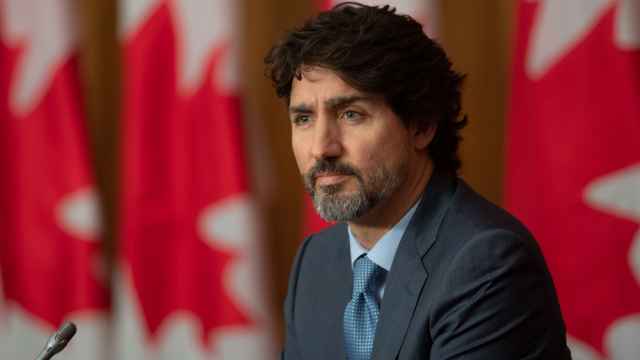This year has started for me with my story being shared around the world, as I was on the verge of getting my Canadian citizenship application refused because of political conviction in Russia for my anti-war activism. The story had a happy ending and I was naturalized days after the CBC article was published. Sadly, it is not the first, and most certainly not the last, time that the Russian government tried to harm its citizens who fled abroad.
I came to Canada in February 2019. For years I worked full-time in a tech company, paid taxes and cared about my neighborhood. I was looking forward to becoming a Canadian citizen and was sure I would make a good one.
Sometimes, I would go to the Russian embassy to protest when I thought it was important. In the fall of 2021, I registered as a volunteer observer in the Russian parliamentary election. That’s when I got a chance to work closely with the people who worked at the Russian Embassy in Ottawa.
When I woke up and read the news that Russian troops were marching on Kyiv, my world ended. It was as if I read that there was a comet heading to Earth that would kill us all. It felt like nothing else mattered, and I just had to do anything I could to stop the war.
I started posting about it on my lifestyle blog and also reached out to embassy staff, begging them to speak up against the war. Every day I left letters near the building’s door and would try to talk to the people walking in and out. I hoped this would somehow help to stop the bloodshed.
One day one of the embassy workers called me by my name and told me that he was reading my blog. Now, I understand that it was a threat. But at the time I brushed it off. Around the same time, my spouse and I applied for Canadian citizenship.
In the fall of 2022, I learned that there was a criminal case opened against me in Russia for a post about the Bucha massacre, and that I am wanted in Russia. I hoped it was some kind of mistake since I could not obtain any proper documents confirming the prosecution.
In April 2023 I was arrested in absentia and finally found a lawyer to represent me. Only at this point did I receive any documents. I immediately sent translated copies to the Canadian immigration ministry (IRCC), along with a detailed explanation that the law that I’m charged with breaking is only used for silencing the truth about the war.
I arrived at my naturalization ceremony on June 7 thinking I was going to become a citizen. But when a question about the criminal charges was asked, it was clear that either IRCC didn’t notice or ignored my letter.
That December I received a letter from the Canadian immigration officer saying, that in their opinion the article that I was convicted for posts against the war would equate to false information under subsection 372(1) of the Canadian Criminal Code. Thus I may be subjected to prohibitions under the Citizenship Act. I had 30 days to send IRCC documents to persuade them otherwise. This was the most stressful time for me after the start of the war. It felt like a betrayal from Canada.
Everyone in Russia learns to live with a feeling of helplessness. You have to get used to the fact the government doesn’t care about you and will try to harm you. You run from that fact or fight it. But I wasn’t ready to feel the same way in Canada. Despite knowing about the country’s problems with racism and its colonial legacy, I never expected that the government would make me prove to them that I am not a criminal in such an obvious case of political persecution from the same Kremlin they claim to oppose. It felt like the ground from under my feet, that I came to Canada to find, was taken away.
The first thing I did was call my immigration lawyer and ask him whether I could be deported to Russia. He told me it was possible. I couldn’t believe what I heard. He explained this would be the worst-case scenario but the fact that this was even theoretically possible, crushed me. With how many things had already gone wrong, the worst-case scenario didn’t feel unrealistic. The lawyer explained that the IRCC saw me as a criminal. I just had to explain to them that it was a mistake.
One reason why Russia opens these criminal cases against activists is to ruin their lives even from afar. It’s one thing to explain this to someone you know. It’s another to explain it to the government you thought would be on your side with the risk of being deported hanging over your head.
The first thing I did was write to my Member of Parliament, notifying them about the letter from the IRCC and asking for help. They said they couldn’t help and that I should follow my lawyer’s advice.
Later, after my case received press coverage, my MP apologized, explaining that there was a mistake in the office and that she didn’t know anything about my situation. If she had known, she would’ve helped me earlier. It was nice to hear, but at the time I thought that I couldn’t count on their support. It felt like I was going against the Canadian government alone. So I decided to look for support elsewhere.
Before the letter from IRCC, I stayed quiet out of fear for my safety. It was clear that this criminal case was mainly an attempt to silence me. I knew there were more risks involved if I continued to do my activism publicly, so I stopped.
But this time the risk of being sent to Russia outweighed everything else, so I turned to the media. Even though it was Russian actions that made me an activist, it was Canada who forcefully outed me as one, even though it carried other risks involved with this publicity that I never wanted and now have to live with.
But even getting the media’s attention wasn’t easy. I reached out to Canadian media to cover my story. After repeatedly being told there were too many sad immigration stories to cover, I realized I was completely on my own. Though my family and friends supported me, they were powerless to solve my situation
Eventually, I was able to get media attention thanks to Rev. Karen Niven-Wigston. I will be forever grateful to her and Matthew Kupfer, the CBC reporter who covered my story. I still believe that if it wasn’t for media and public attention, I would still be in that bureaucratic limbo or maybe would even have to go to court. I’ll never forget the paralyzing feeling of facing the life-threatening risk of being deported to Russia, to a potentially fatal sentence of at least 8 years in prison.
But there was another side to this that horrified me even more. If I lost my case, it could have become a precedent that could affect Russian citizens in other countries.
This fear might sound silly to people unfamiliar with how Russian citizens have had to live since the start of the invasion. But since Feb. 24, a lot of Russians, particularly those opposed to the war, have felt like the ultimate bad guys. While the Russian government hunts us down, many democratic countries don’t want to let us in, close our bank accounts, and tell journalists poisoned on their territory that they should have been more careful.
At the same time, we feel guilty. Because how can we complain while Russia is bombing Ukraine? People and even public figures around the world tell us that we deserve every bad thing that happens to us because of this war. The feeling that I had to stand up for others in my situation gave me the strength not to give up when I felt the most desperate.
By Jan. 7, all my documents arguing that I am not a criminal had to be delivered to IRCC. With other activists from the Russian Canadian Democratic Alliance, we prepared a petition in my support. But I felt so lonely and helpless from facing so much indifference already that I couldn’t stop crying while I was sending the first bunch of letters. I was afraid that no one would sign the petition. I felt guilty asking for help when I was in a safe country. The first person to sign the petition other than my friends, was Maxim Katz - a Russian politician and blogger. That was the first moment when I finally felt like I wasn’t alone.
On Jan. 9, I was crying again, overwhelmed with fear. I had Nobel Peace Prize laureates signing the petition and MPs reaching out in support but I still didn’t know if it was enough.
That day around noon I received a call from IRCC, and a couple of hours later I had a private naturalization ceremony. I wasn’t able to sing the anthem and didn’t get to hear a speech from the judge about how much I deserved to finally become a citizen like my husband did. But I was finally a citizen, and could finally feel relieved. Right?
It has been months since that day. Yes, my story had a happy ending, but why did I really need to go through this? Being thrust into the public eye was the last thing I wanted. For people who were closely following the story from the beginning, it was obvious, that this whole situation was either a series of horrible mistakes or, at worst, a supporter of Russia was assigned to my case. I was never given any explanation. I hope it wasn’t the latter, since this would probably raise some national security concerns for Canada.
I understand this is not the worst thing in the world that could happen to a person. And yet I cannot help but cry whenever I have to remember everything I had to go through to get the citizenship I deserved, just because my homeland decided to terrorize me. It feels like the Canadian government has contributed to that, and I cannot shake off this feeling of betrayal no matter how hard I try.
I want Canada to finally start putting its money where its mouth is and truly protect activists from authoritarian regimes in action so nobody else has to go through this. If other people in my situation didn’t get the attention I did, what would happen to them? I don’t know. But I’m determined to make sure it won’t happen again.
I started a petition asking the Canadian government to implement a list of laws used by foreign countries, like Belarus, China, Iran and Syria, for political persecution and that do not have any analogous laws in Canada. The idea is that immigration officers could refer to this list, and know that people convicted under laws from this list can be given citizenship, a visa, or refugee status.
I realize that politically motivated cases like mine are rare. But even if there is just one affected every year, would that not already be too many? If we all agree that these activists are precious to the democratic world, then I think we can start changing things to make their lives easier, so that they can focus on making the world a better place. Easing the immigration process can be a step in that direction.
The stress I have lived under for the last year is not going to go away any time soon. As long as Putin’s regime thrives I, and other anti-war Russians around the world, will have to be cautious. We can't go back home to see our families, even if they need us. We will just be arrested the moment we try to cross the border.
There are even cases of people who protested against the war and thought they were safe because there were no criminal cases opened against them, only to be arrested at the airport with the case being opened after the arrest.
This happened to the Russian singer Sharlot, who publicly burned his Russian passport, saying he no longer considers himself a Russian citizen and wanted to go to Kyiv. He was arrested at St. Petersburg’s Pulkovo Airport in November 2023 after arriving from Armenia. Months later, he is still under arrest, with a fifth criminal case opened against him in May.
The most common risk for those living abroad is being arrested while traveling in countries with agreements with Russia about exchanging criminals. The best-case scenario here is getting arrested at the border, and then being released at court. At worst, they could be returned to Russia.
This almost happened to Sergey Kuropov, who was deported from Vietnam at Russia’s demand because of his anti-war statements. He had already lived in Vietnam for years before his deportation. Afterward, he applied for refugee status and started a new life in Canada.
The case of Bi-2, a popular rock back who was almost deported back to Russia, demonstrated how dangerous it can be for Russian citizens abroad. There are cases of the Russian government straight-out kidnapping people in other countries, like deserter Dmitry Setrakov in Armenia.
Since they’re technically barred from leaving the country, Russian citizens abroad with criminal convictions at some point will also face the issue of not being able to renew their passports. They can’t visit an embassy or consulate, their documents could be confiscated. This means they wouldn't be able to apply for a visa or citizenship in any other country since they won't have a valid travel document. We don’t know the solution yet other than trying to get another citizenship as soon as possible after getting convicted, which is not easy and might be very hard to do for some people.
There are many other ways for the government to silence the anti-war voices around the world that the public doesn't know of. Most independent media and researchers have now been labeled “foreign agents,” banning them from promoting their services and raising revenue from advertising. This puts these people and organizations that rely on donations in a tough position, as they can no longer receive money from abroad, with even access to cryptocurrencies restricted.
In this pile of concerns that Russian citizens and activists face it was important to me to tackle at least this one and make the immigration process easier for people facing political persecution. The risks I faced after going public with my story I wanted to at least bring some benefit to other people in my position. After all the media attention my story received, I hoped that the Canadian government would recognize the need for change. I was wrong.
On May 31, I received an official response from the immigration minister, who told me the process “does not place the burden on those facing political persecution to prove that foreign laws that they may have violated are not crimes in Canada.” They claimed assessing everyone on a case-by-case basis was better than an automatic list as it allowed officials to assess each candidate on their own merit.
I’m furious at this response, which fails to recognize that activists must prove to the immigration officer that they are not criminals and refuse to take responsibility and accept that this takes place at all. I feel like I am being gaslighted into believing that everything that happened to me was actually for my own good. I guess it’s true that I did not have to prove I am not a criminal. But if I didn’t, I would have been deported to Russia. The ordeal I went through meant I had to work with a psychotherapist to avoid developing PTSD.
I know it’s not over. I plan to fight further. Before I had to only fight Russia to stop the war and let people in Russia and occupied Ukraine live free. But now, it seems I also have to fight the Canadian government as well. What immigration to Canada taught me is that no country is perfect, and no government will help people just out of the goodness of politicians’ hearts. So I want to ask everyone who reads this to keep fighting. Take breaks when you need them and take care of yourself, but never give up. We can win if we work together.
A Message from The Moscow Times:
Dear readers,
We are facing unprecedented challenges. Russia's Prosecutor General's Office has designated The Moscow Times as an "undesirable" organization, criminalizing our work and putting our staff at risk of prosecution. This follows our earlier unjust labeling as a "foreign agent."
These actions are direct attempts to silence independent journalism in Russia. The authorities claim our work "discredits the decisions of the Russian leadership." We see things differently: we strive to provide accurate, unbiased reporting on Russia.
We, the journalists of The Moscow Times, refuse to be silenced. But to continue our work, we need your help.
Your support, no matter how small, makes a world of difference. If you can, please support us monthly starting from just $2. It's quick to set up, and every contribution makes a significant impact.
By supporting The Moscow Times, you're defending open, independent journalism in the face of repression. Thank you for standing with us.
Remind me later.






